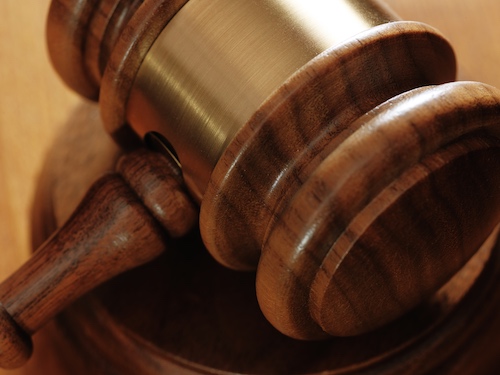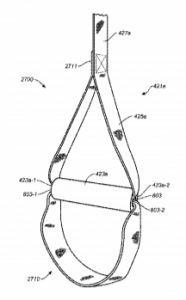 On October 25th, U.S. District Judge Beth Labson Freeman of the Northern District of California issued an order granting a motion for reconsideration filed by plaintiff Fitness Anywhere in a patent infringement case against Woss Enterprises. In a rare move, Judge Freeman granted the motion, which withdrew a previous order that invalidated patent claims to a Fitness Anywhere patent the company considers to be its “crown jewel” patent and which covers its TRX fitness equipment.
On October 25th, U.S. District Judge Beth Labson Freeman of the Northern District of California issued an order granting a motion for reconsideration filed by plaintiff Fitness Anywhere in a patent infringement case against Woss Enterprises. In a rare move, Judge Freeman granted the motion, which withdrew a previous order that invalidated patent claims to a Fitness Anywhere patent the company considers to be its “crown jewel” patent and which covers its TRX fitness equipment.
Fitness Anywhere, which sells fitness equipment under the TRX brand name, sued Woss Enterprises for patent and trademark infringement along with unfair competition and tortious interference claims for Woss’ sale of allegedly infringing resistance exercise bands. In April 2017, Fitness Anywhere was granted a $6.8 million damages award after a jury found that Woss had willfully infringed upon patents asserted in the case.
 In August 2016, about seven months prior to the damages award being granted to Fitness Anywhere, Judge Freeman granted summary judgment to Woss with respect the claims of one of the patents asserted. Woss argued that the asserted claims were invalid under 35 U.S.C. § 103 grounds for obviousness. The patent claims invalidated by Judge Freeman were from U.S. Patent No. 7806814, titled Combination Grip for an Exercise Device. Issued in October 2010, it covers an exercise apparatus having an inelastic portion having an end including a first loop, a hand grip attached to that loop and a second loop attached to the hand grip such that the second loop is a continuous loop passing through the hand grip and the exercise apparatus is adapted to support the weight of a user by the hand grip and the second loop. The asserted claims of the ‘814 patent were deemed to be obvious in light of two prior art references: U.S. Patent 7044896, titled Exercise Device Including Adjustable, Inelastic Straps; and U.S. Patent No. 7090622, titled Exercise Device Grips and Accessories for Exercise Devices.
In August 2016, about seven months prior to the damages award being granted to Fitness Anywhere, Judge Freeman granted summary judgment to Woss with respect the claims of one of the patents asserted. Woss argued that the asserted claims were invalid under 35 U.S.C. § 103 grounds for obviousness. The patent claims invalidated by Judge Freeman were from U.S. Patent No. 7806814, titled Combination Grip for an Exercise Device. Issued in October 2010, it covers an exercise apparatus having an inelastic portion having an end including a first loop, a hand grip attached to that loop and a second loop attached to the hand grip such that the second loop is a continuous loop passing through the hand grip and the exercise apparatus is adapted to support the weight of a user by the hand grip and the second loop. The asserted claims of the ‘814 patent were deemed to be obvious in light of two prior art references: U.S. Patent 7044896, titled Exercise Device Including Adjustable, Inelastic Straps; and U.S. Patent No. 7090622, titled Exercise Device Grips and Accessories for Exercise Devices.
“We moved for a reconsideration of the ‘814 patent because we felt that it was invalidated a little too quickly as part of the legal proceedings,” said Alain Villeneuve, Partner at Duane Morris LLP and lead counsel representing Fitness Anywhere in the infringement case against Woss. He noted that Judge Freeman had ordered both sides to file briefs related to the motion for summary judgment that were to be no more than 15 pages long. When including exhibits attached to their brief, Woss’ filing reached 453 pages in length and Fitness Anywhere’s legal representation felt that the incredible amount of paperwork caused Judge Freeman to simplify case law and overlook certain important points in finding the ‘814 patent to be invalid for obviousness.
One of the main pieces of evidence offered by Fitness Anywhere to support validity of the ‘814 patent claims, which the court initially refused to consider, was an affidavit filed by Randy Hetrick, CEO of Fitness Anywhere and the inventor on both the ‘814 patent as well as both patents asserted as invalidating prior art by Woss. This affidavit included a declaration regarding secondary considerations including a lack of strap-based exercise devices at the time that TRX entered the market, unsuccessful alternative designs and the company’s commercial success based on sales of the patented exercise device. “Once that affidavit was back in the record, there was no support for invalidation,” Villeneuve said.
Judge Freeman’s recent order notes that “motions for reconsideration are disfavored” and shouldn’t be granted unless there are highly unusual circumstances surrounding the motion. In Fitness Anywhere’s case, this patent infringement proceeding was stayed for a period of about 16 months because Woss had entered into bankruptcy proceedings. “The law changed significantly during the 16 months that we were on hold,” Villeneuve said. Specifically, case law stemming from decisions of the Court of Appeals for the Federal Circuit have affected how courts can rule in cases involving single reference obviousness assertions. Such case law was important in this matter as the patents asserted as prior art were the patents issued based on the parent and grandparent applications to the ‘814 patent. Although two patents were asserted as prior art, they were common in subject matter and that essentially rendered the two patents as a single reference. “It was complicated but Judge Freeman got it right on the money in the motion to reconsider,” Villeneuve said, adding that Judge Freeman has proven herself to be very solid on patent law matters.
The resurrection of the ‘814 patent claims was of great importance to Fitness Anywhere because it covered a modification to the company’s fitness equipment that helped it achieve great success in the marketplace. The invention essentially consisted of taking a handle accessory that was attachable to the fitness equipment via velcro and making it a permanent fixture of the equipment. Although Fitness Anywhere had told the court that it wouldn’t pursue further infringement damages against Woss based on the reinstated ‘814 patent claims, in large part because of Woss’ bankruptcy status, Judge Freeman’s granting the motion for reconsideration restores an important asset that can now again be asserted against many of the at least 100 companies that are allegedly infringing the patent behind TRX fitness equipment.
Image Source: Deposit Photos.

![[IPWatchdog Logo]](https://ipwatchdog.com/wp-content/themes/IPWatchdog%20-%202023/assets/images/temp/logo-small@2x.png)


![[Advertisement]](https://ipwatchdog.com/wp-content/uploads/2024/04/Artificial-Intelligence-2024-REPLAY-sidebar-700x500-corrected.jpg)
![[Advertisement]](https://ipwatchdog.com/wp-content/uploads/2024/04/Patent-Litigation-Masters-2024-sidebar-700x500-1.jpg)

![[Advertisement]](https://ipwatchdog.com/wp-content/uploads/2021/12/WEBINAR-336-x-280-px.png)
![[Advertisement]](https://ipwatchdog.com/wp-content/uploads/2021/12/2021-Patent-Practice-on-Demand-recorded-Feb-2021-336-x-280.jpg)
![[Advertisement]](https://ipwatchdog.com/wp-content/uploads/2021/12/Ad-4-The-Invent-Patent-System™.png)






Join the Discussion
No comments yet.